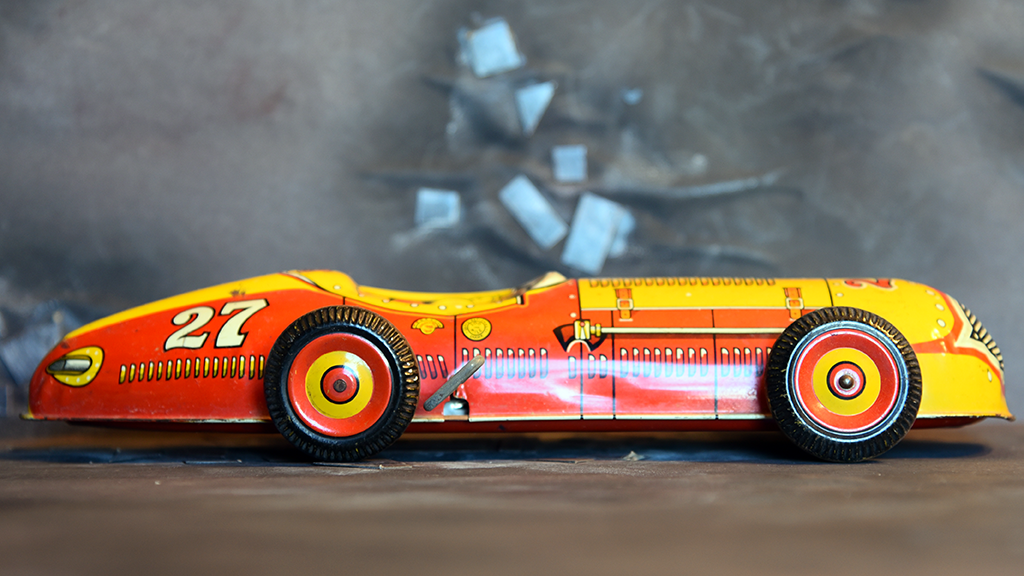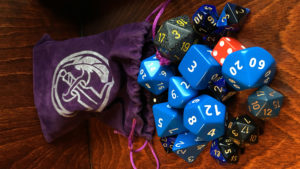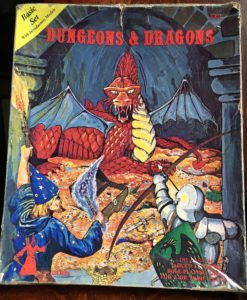 As a man who is far closer to fifty than the ten-year old, who saw that first, fateful handful of six weirdly shaped dice requiring the numbers to be filled in with a Crayon would ever have imagined he would be, I can tell you, that kid needed roleplaying games (“RPGs”) in his life. Back in those days, it wasn’t as trendy to be a nerd as it is today. Celebrities didn’t boast of their nerd-cred. The closest thing we had to the Marvel cinematic universe was Lou Ferrigno painted green. We just had gotten our first taste of Doctor Jones fighting Nazis, and we were all still living with the shock of Darth Vader saying, “I am your father.” For chubby, ten-year old me the coolest thing that had happened to me before I entered my first graph paper dungeon was my buddy’s dad sneaking us all into watching Snake Plissken make his escape from New York. That was until I played Dungeons & Dragons (“D&D”).
As a man who is far closer to fifty than the ten-year old, who saw that first, fateful handful of six weirdly shaped dice requiring the numbers to be filled in with a Crayon would ever have imagined he would be, I can tell you, that kid needed roleplaying games (“RPGs”) in his life. Back in those days, it wasn’t as trendy to be a nerd as it is today. Celebrities didn’t boast of their nerd-cred. The closest thing we had to the Marvel cinematic universe was Lou Ferrigno painted green. We just had gotten our first taste of Doctor Jones fighting Nazis, and we were all still living with the shock of Darth Vader saying, “I am your father.” For chubby, ten-year old me the coolest thing that had happened to me before I entered my first graph paper dungeon was my buddy’s dad sneaking us all into watching Snake Plissken make his escape from New York. That was until I played Dungeons & Dragons (“D&D”).
D&D, as well as any RPG taught me more than 10-year old me would have ever guessed it could. RPGs improved my basic math skills. RPGs enhanced my vocabulary. I mean, words like portcullis, oubliette, and skullduggery were not in my personal lexicon before RPGs. Besides vocabulary, roleplaying games helped my basic math skills. While I am by no means a genius, RPGs took a C and D math student and transformed him into getting Bs and As. RPGs did something even cooler, and made a dyslexic kid want to read, even though it was hard. Not only did RPGs make me look to read as much sword and sorcery fiction and medieval history as I could get my hands on, but much headier material. I’m not sure how many fifth graders have read and could understand most of Sun Tzu’s The Art of War, but this kid did and could. RPGs made me want to write. Be they adventures, world content, and even stories — I wanted and did write them. Nowadays I occasionally get paid to do so.
RPGs taught me critical thinking and game theory, though I had no idea they were doing so. RPGs taught me about resource management. From Hit Points, Spell Slots, heck even making sure you have enough rations to make a long journey. Sure, it is cool to blast something with a fireball spell, but that’s a 3rd level spell and you only have so many, so why waste it when you have lesser spells that can get the job done? Save the fireball for when it truly counts and use magic missile, or better yet, just whack the goblin with your quarterstaff.
RPGs can teach you principles that aid you in real life. I mean, an equal division of treasure is learning to share (a lesson many an older gamer still needs to learn). They teach you to protect those less powerful than yourself. Give a helping hand when it is needed. Right wrongs where you can. The right words are most times more effective than violence. Listening and attention are powerful tools. Even small details matter. Commitment is a virtue. Tenacity in all things makes you valuable. The good guys don’t always win, but you can proudly look at yourself in the mirror afterwards knowing you did your best. Bullies eventually get what is coming to them. There is always more work to be done. Battles don’t make warriors. Honor is something that must be cherished. You are only as strong as your friends. You are only as good as your word. The easiest path is not always the right path. Stand your ground, even if you have to stand it alone. Cheating to win only cheats yourself. Knowledge is power. Everyone has a part to play.
RPGs taught me the value of communal practices. Most gamers happily share their source books, dice, and knowledge with others at their game table. They share meals, snacks and beverages. Long time game groups feel like holiday family gatherings (that you want to attend).
RPGs build friendships better than most things, because they give you a gathering of like-minded folks to interact with. A group of folks you share many of the same hobbies, interests and sense of humor with. Those interactions are usually measured in hours not instants. As a kid seeking peers and the approval of said peers, this is everything. It also kind of trains you as adults to appreciate this time. As we age, gamers don’t spend that much time with anyone else, save with their family or at their job place. Clearing out a goblin lair for four hours is most times a heck of lot more fun than being a keyboard monkey trapped in a cubicle, asking the repetitive “do you want fries with that?”, running a cash register, digging a foundation, riding on the back of trash truck, driving an Uber, painting a house, moving a family home, unloading a truck, running a forklift, preparing tax forms, reading or writing contracts, grooming dogs, or any other day job or career oriented work. We learn to covet that time. You most times don’t make lifelong friends cleaning bathrooms, reading electric meters, or drawing building plans. Attending your third cousin’s wedding or mowing your grandma’s lawn or going to three Thanksgiving dinners in the same day because you don’t want to slight any of your extended family is a far cry less fun than saving a town from a dragon attack. RPGs can give you that as a kid and as an adult.
The greatest things RPGs gave me was far from reading, writing, arithmetic, or even some of the lifelong friendships. It taught me how to communicate. Everything from reading social cues, conflict resolution, learning to work as a team, taking on leadership roles, public speaking, teaching others, even expressing my feelings. In short, RPGs have made me a better human.
RPGs are at worst, good fun and at best a place where you can find your truest self.


 As a man who is far closer to fifty than the ten-year old, who saw that first, fateful handful of six weirdly shaped dice requiring the numbers to be filled in with a Crayon would ever have imagined he would be, I can tell you, that kid needed roleplaying games (“RPGs”) in his life. Back in those days, it wasn’t as trendy to be a nerd as it is today. Celebrities didn’t boast of their nerd-cred. The closest thing we had to the Marvel cinematic universe was Lou Ferrigno painted green. We just had gotten our first taste of Doctor Jones fighting Nazis, and we were all still living with the shock of Darth Vader saying, “I am your father.” For chubby, ten-year old me the coolest thing that had happened to me before I entered my first graph paper dungeon was my buddy’s dad sneaking us all into watching Snake Plissken make his escape from New York. That was until I played Dungeons & Dragons (“D&D”).
As a man who is far closer to fifty than the ten-year old, who saw that first, fateful handful of six weirdly shaped dice requiring the numbers to be filled in with a Crayon would ever have imagined he would be, I can tell you, that kid needed roleplaying games (“RPGs”) in his life. Back in those days, it wasn’t as trendy to be a nerd as it is today. Celebrities didn’t boast of their nerd-cred. The closest thing we had to the Marvel cinematic universe was Lou Ferrigno painted green. We just had gotten our first taste of Doctor Jones fighting Nazis, and we were all still living with the shock of Darth Vader saying, “I am your father.” For chubby, ten-year old me the coolest thing that had happened to me before I entered my first graph paper dungeon was my buddy’s dad sneaking us all into watching Snake Plissken make his escape from New York. That was until I played Dungeons & Dragons (“D&D”). Each of us has memories associated with games, memories that don’t fade. Learning to play gin rummy or solitaire from a grandparent. It was in quiet times like this, when my grandparents were watching me as a child, that I learned about intergenerational relationships and roots. Playing hide and seek or tag (for us it was a tag variation we called run around the cellar door) with neighbors and cousins. As an awkward, uncoordinated kid, games like this helped me understand that mental skills were just as important as physical skills. The informal, unsupervised play gave us the opportunity to resolve disputes on our own and to establish systems for working together, even when we were working in opposition. Sports in high school often involved brutal and explosive confrontations, ending up with more than a couple of trips to the ER. But, it developed my persistence, it fostered my sense of cooperation, it taught me the value of preparation, and I learned how to move past failure.
Each of us has memories associated with games, memories that don’t fade. Learning to play gin rummy or solitaire from a grandparent. It was in quiet times like this, when my grandparents were watching me as a child, that I learned about intergenerational relationships and roots. Playing hide and seek or tag (for us it was a tag variation we called run around the cellar door) with neighbors and cousins. As an awkward, uncoordinated kid, games like this helped me understand that mental skills were just as important as physical skills. The informal, unsupervised play gave us the opportunity to resolve disputes on our own and to establish systems for working together, even when we were working in opposition. Sports in high school often involved brutal and explosive confrontations, ending up with more than a couple of trips to the ER. But, it developed my persistence, it fostered my sense of cooperation, it taught me the value of preparation, and I learned how to move past failure. Yet, the best games also stimulated my imagination by drawing me into a story. It might be as simple (and pedantic) as a board game like The Game of Life in which the objectives of the game are dressed in a fictitious—yet commonplace—adult experience. By making the fictitious, adult experience more removed from the everyday, like in Monopoly, players immerse themselves even more into the story of the game, actually feeling as if they own the properties. The more interactive the storytelling, the more immersive the experience becomes.
Yet, the best games also stimulated my imagination by drawing me into a story. It might be as simple (and pedantic) as a board game like The Game of Life in which the objectives of the game are dressed in a fictitious—yet commonplace—adult experience. By making the fictitious, adult experience more removed from the everyday, like in Monopoly, players immerse themselves even more into the story of the game, actually feeling as if they own the properties. The more interactive the storytelling, the more immersive the experience becomes. In the Fall of 1978, my parents gave me Dungeons & Dragons. I still play it today. And, while it may undermine my geek cred, I did not open the box and begin playing immediately, never putting it down over the last four decades. I was the first of my friends to get it and there was nobody that I knew who could teach it to me. I learned and my friends learned, and we taught each other. We persisted, because we were already immersed in Tolkien’s world of adventure and imagination and D&D was an opportunity to make those worlds our own. The stories drew us into the game. Then the richness of the game drew us into other stories, including stories of our own creation.
In the Fall of 1978, my parents gave me Dungeons & Dragons. I still play it today. And, while it may undermine my geek cred, I did not open the box and begin playing immediately, never putting it down over the last four decades. I was the first of my friends to get it and there was nobody that I knew who could teach it to me. I learned and my friends learned, and we taught each other. We persisted, because we were already immersed in Tolkien’s world of adventure and imagination and D&D was an opportunity to make those worlds our own. The stories drew us into the game. Then the richness of the game drew us into other stories, including stories of our own creation.